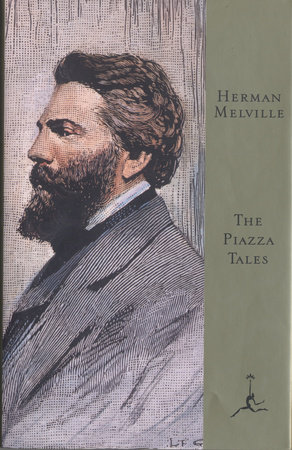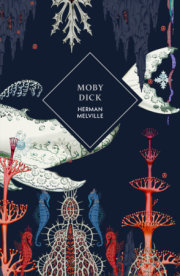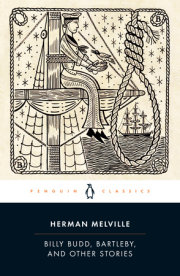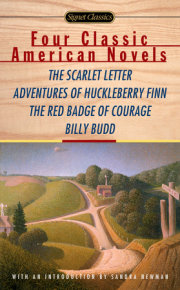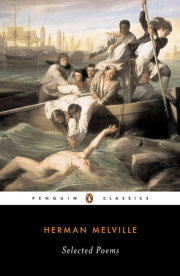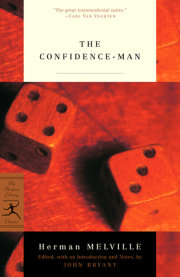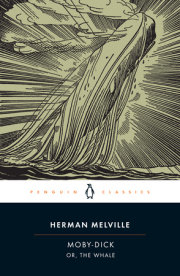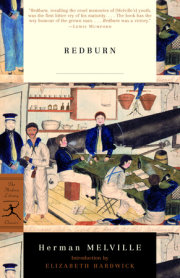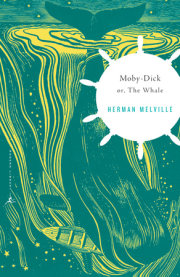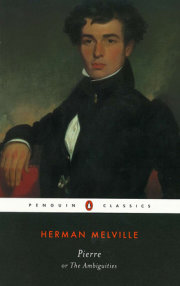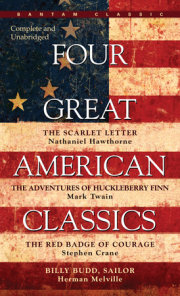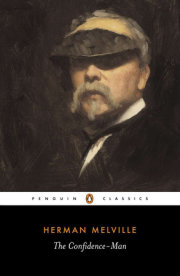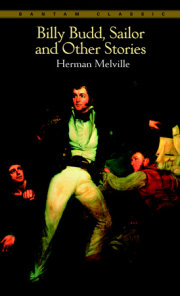When I removed into the country, it was to occupy an old-fashioned farm-house, which had no piazza--a deficiency the more regretted, because not only did I like piazzas as somehow combining the coziness of in-doors with the freedom of out-doors, and it is so pleasant to inspect your thermometer there, but the country round about was such a picture, that in berry time no boy climbs hill or crosses vale without coming upon easels planted in every nook, and sun-burnt painters painting there. A very paradise of painters. The circle of the stars cut by the circle of the mountains. At least, so looks it from the house; though, once upon the mountains, no circle of them can you see. Had the site been chosen five rods off, this charmed ring would not have been.
The house is old. Seventy years since, from the heart of the Hearth Stone Hills, they quarried the Kaaba, or Holy Stone, to which, each Thanksgiving, the social pilgrims used to come. So long ago, that, in digging for the foundation, the workmen used both spade and axe, fighting the Troglodytes of those subterranean parts--sturdy roots of a sturdy wood, encamped upon what is now a long land-slide of sleeping meadow, sloping away off from my poppy-bed. Of that knit wood, but one survivor stands--an elm, lonely through steadfastness.
Whoever built the house, he builded better than he knew; or else Orion in the zenith flashed down his Damocles' sword to him some starry night, and said, 'Build there.' For how, otherwise, could it have entered the builder's mind, that, upon the clearing being made, such a purple prospect would be his?--nothing less than Greylock, with all his hills about him, like Charlemagne among his peers.
Now, for a house, so situated in such a country, to have no piazza for the convenience of those who might desire to feast upon the view, and take their time and ease about it, seemed as much of an omission as if a picture-gallery should have no bench; for what but picture-galleries are the marble halls of these same limestone hills?--galleries hung, month after month anew, with pictures ever fading into pictures ever fresh. And beauty is like piety--you cannot run and read it; tranquillity and constancy, with, now-a-days, an easy chair, are needed. For though, of old, when reverence was in vogue, and indolence was not, the devotees of Nature, doubtless, used to stand and adore--just as, in the cathedrals of those ages, the worshipers of a higher Power did--yet, in these times of failing faith and feeble knees, we have the piazza and the pew.
During the first year of my residence, the more leisurely to witness the coronation of Charlemagne (weather permitting, they crown him every sunrise and sunset), I chose me, on the hill-side bank near by, a royal lounge of turf--a green velvet lounge, with long, moss-padded back; while at the head, strangely enough, there grew (but, I suppose, for heraldry) three tufts of blue violets in a field-argent of wild strawberries; and a trellis, with honey-suckle, I set for canopy. Very majestical lounge, indeed. So much so, that here, as with the reclining majesty of Denmark in his orchard, a sly ear-ache invaded me. But, if damps abound at times in Westminster Abbey, because it is so old, why not within this monastery of mountains, which is older?
A piazza must be had.
The house was wide--my fortune narrow; so that, to build a panoramic piazza, one round and round, it could not be--although, indeed, considering the matter by rule and square, the carpenters, in the kindest way, were anxious to gratify my furthest wishes, at I've forgotten how much a foot.
Upon but one of the four sides would prudence grant me what I wanted. Now, which side?
To the east, that long camp of the Hearth Stone Hills, fading far away towards Quito; and every fall, a small white flake of something peering suddenly, of a coolish morning, from the topmost cliff--the season's new-dropped lamb, its earliest fleece; and then the Christmas dawn, draping those dun highlands with red-barred plaids and tartans--goodly sight from your piazza, that. Goodly sight; but, to the north is Charlemagne--can't have the Hearth Stone Hills with Charlemagne.
Well, the south side. Apple-trees are there. Pleasant, of a balmy morning, in the month of May, to sit and see that orchard, white-budded, as for a bridal; and, in October, one green arsenal yard; such piles of ruddy shot. Very fine, I grant; but, to the north is Charlemagne.
The west side, look. An upland pasture, alleying away into a maple wood at top. Sweet, in opening spring, to trace upon the hill-side, otherwise gray and bare&mdashto trace, I say, the oldest paths by their streaks of earliest green. Sweet, indeed, I can't deny; but, to the north is Charlemagne.
So Charlemagne, he carried it. It was not long after 1848; and, somehow, about that time, all round the world, these kings, they had the casting vote, and voted for themselves.
No sooner was ground broken, than all the neighborhood, neighbor Dives, in particular, broke, too--into a laugh. Piazza to the north! Winter piazza! Wants, of winter midnights, to watch the Aurora Borealis, I suppose; hope he's laid in good store of Polar muffs and mittens.
That was in the lion month of March. Not forgotten are the blue noses of the carpenters, and how they scouted at the greenness of the cit, who would build his sole piazza to the north. But March don't last forever; patience, and August comes. And then, in the cool elysium of my northern bower, I, Lazarus in Abraham's bosom, cast down the hill a pitying glance on poor old Dives, tormented in the purgatory of his piazza to the south.
But, even in December, this northern piazza does not repel--nipping cold and gusty though it be, and the north wind, like any miller, bolting by the snow, in finest flour--for then, once more, with frosted beard, I pace the sleety deck, weathering Cape Horn.
In summer, too, Canute-like, sitting here, one is often reminded of the sea. For not only do long ground-swells roll the slanting grain, and little wavelets of the grass ripple over upon the low piazza, as their beach, and the blown down of dandelions is wafted like the spray, and the purple of the mountains is just the purple of the billows, and a still August noon broods upon the deep meadows, as a calm upon the Line; but the vastness and the lonesomeness are so oceanic, and the silence and the sameness, too, that the first peep of a strange house, rising beyond the trees, is for all the world like spying, on the Barbary coast, an unknown sail.
And this recalls my inland voyage to fairy-land. A true voyage; but, take it all in all, interesting as if invented.
From the piazza, some uncertain object I had caught, mysteriously snugged away, to all appearance, in a sort of purpled breast-pocket, high up in a hopper-like hollow, or sunken angle, among the northwestern mountains--yet, whether, really, it was on a mountain-side, or a mountain-top, could not be determined; because, though, viewed from favorable points, a blue summit, peering up away behind the rest, will, as it were, talk to you over their heads, and plainly tell you, that, though he (the blue summit) seems among them, he is not of them (God forbid!), and, indeed, would have you know that he considers himself--as, to say truth, he has good right--by several cubits their superior, nevertheless, certain ranges, here and there double-filed, as in platoons, so shoulder and follow up upon one another, with their irregular shapes and heights, that, from the piazza, a nigher and lower mountain will, in most states of the atmosphere, effacingly shade itself away into a higher and further one; that an object, bleak on the former's crest, will, for all that, appear nested in the latter's flank. These mountains, somehow, they play at hide-and-seek, and all before one's eyes.
But, be that as it may, the spot in question was, at all events, so situated as to be only visible, and then but vaguely, under certain witching conditions of light and shadow.
Indeed, for a year or more, I knew not there was such a spot, and might, perhaps, have never known, had it not been for a wizard afternoon in autumn--late in autumn--a mad poet's afternoon; when the turned maple woods in the broad basin below me, having lost their first vermilion tint, dully smoked, like smouldering towns, when flames expire upon their prey; and rumor had it, that this smokiness in the general air was not all Indian summer--which was not used to be so sick a thing, however mild--but, in great part, was blown from far-off forests, for weeks on fire, in Vermont; so that no wonder the sky was ominous as Hecate's cauldron--and two sportsmen, crossing a red stubble buck-wheat field, seemed guilty Macbeth and foreboding Banquo; and the hermit-sun, hutted in an Adullam cave, well towards the south, according to his season, did little else but, by indirect reflection of narrow rays shot down a Simplon pass among the clouds, just steadily paint one small, round, strawberry mole upon the wan cheek of northwestern hills. Signal as a candle. One spot of radiance, where all else was shade.
Fairies there, thought I; some haunted ring where fairies dance.
Time passed; and the following May, after a gentle shower upon the mountains--a little shower islanded in misty seas of sunshine; such a distant shower--and sometimes two, and three, and four of them, all visible together in different parts--as I love to watch from the piazza, instead of thunder storms, as I used to, which wrap old Greylock, like a Sinai, till one thinks swart Moses must be climbing among scathed hemlocks there; after, I say, that gentle shower, I saw a rainbow, resting its further end just where, in autumn, I had marked the mole. Fairies there, thought I; remembering that rainbows bring out the blooms, and that, if one can but get to the rainbow's end, his fortune is made in a bag of gold. Yon rainbow's end, would I were there, thought I. And none the less I wished it, for now first noticing what seemed some sort of glen, or grotto, in the mountain side; at least, whatever it was, viewed through the rainbow's medium, it glowed like the Potosi mine. But a work-a-day neighbor said, no doubt it was but some old barn--an abandoned one, its broadside beaten in, the acclivity its back-ground. But I, though I had never been there, I knew better.
A few days after, a cheery sunrise kindled a golden sparkle in the same spot as before. The sparkle was of that vividness, it seemed as if it could only come from glass. The building, then--if building, after all, it was--could, at least, not be a barn, much less an abandoned one; stale hay ten years musting in it. No; if aught built by mortal, it must be a cottage; perhaps long vacant and dismantled, but this very spring magically fitted up and glazed.
Again, one noon, in the same direction, I marked, over dimmed tops of terraced foliage, a broader gleam, as of a silver buckler, held sunwards over some croucher's head; which gleam, experience in like cases taught, must come from a roof newly shingled. This, to me, made pretty sure the recent occupancy of that far cot in fairy land.
Day after day, now, full of interest in my discovery, what time I could spare from reading the Midsummer Night's Dream, and all about Titania, wishfully I gazed off towards the hills; but in vain. Either troops of shadows, an imperial guard, with slow pace and solemn, defiled along the steeps; or, routed by pursuing light, fled broadcast from east to west--old wars of Lucifer and Michael; or the mountains, though unvexed by these mirrored sham fights in the sky, had an atmosphere otherwise unfavorable for fairy views. I was sorry; the more so, because I had to keep my chamber for some time after&mdashwhich chamber did not face those hills.
At length, when pretty well again, and sitting out, in the September morning, upon the piazza, and thinking to myself, when, just after a little flock of sheep, the farmers' banded children passed, a-nutting, and said, 'How sweet a day'--it was, after all, but what their fathers call a weather-breeder--and, indeed, was become so sensitive through my illness, as that I could not bear to look upon a Chinese creeper of my adoption, and which, to my delight, climbing a post of the piazza, had burst out in starry bloom, but now, if you removed the leaves a little, showed millions of strange, cankerous worms, which, feeding upon those blossoms, so shared their blessed hue, as to make it unblessed evermore--worms, whose germs had doubtless lurked in the very bulb which, so hopefully, I had planted: in this ingrate peevishness of my weary convalescence, was I sitting there; when, suddenly looking off, I saw the golden mountain-window, dazzling like a deep-sea dolphin. Fairies there, thought I, once more; the queen of fairies at her fairy-window; at any rate, some glad mountain-girl; it will do me good, it will cure this weariness, to look on her. No more; I'll launch my yawl--ho, cheerly, heart! and push away for fairy-land--for rainbow's end, in fairy-land.
How to get to fairy-land, by what road, I did not know; nor could any one inform me; not even one Edmund Spenser, who had been there--so he wrote me--further than that to reach fairy-land, it must be voyaged to, and with faith. I took the fairy-mountain's bearings, and the first fine day, when strength permitted, got into my yawl--high-pommeled, leather one--cast off the fast, and away I sailed, free voyager as an autumn leaf. Early dawn; and, sallying westward, I sowed the morning before me.
Copyright © 2000 by Herman Melville. All rights reserved. No part of this excerpt may be reproduced or reprinted without permission in writing from the publisher.

